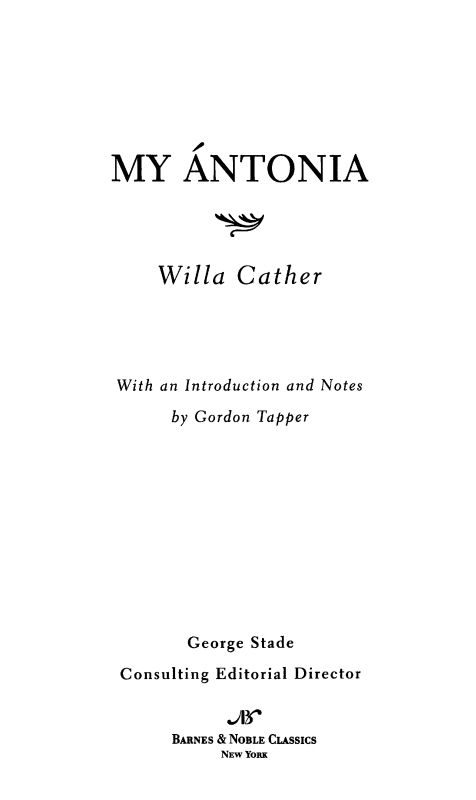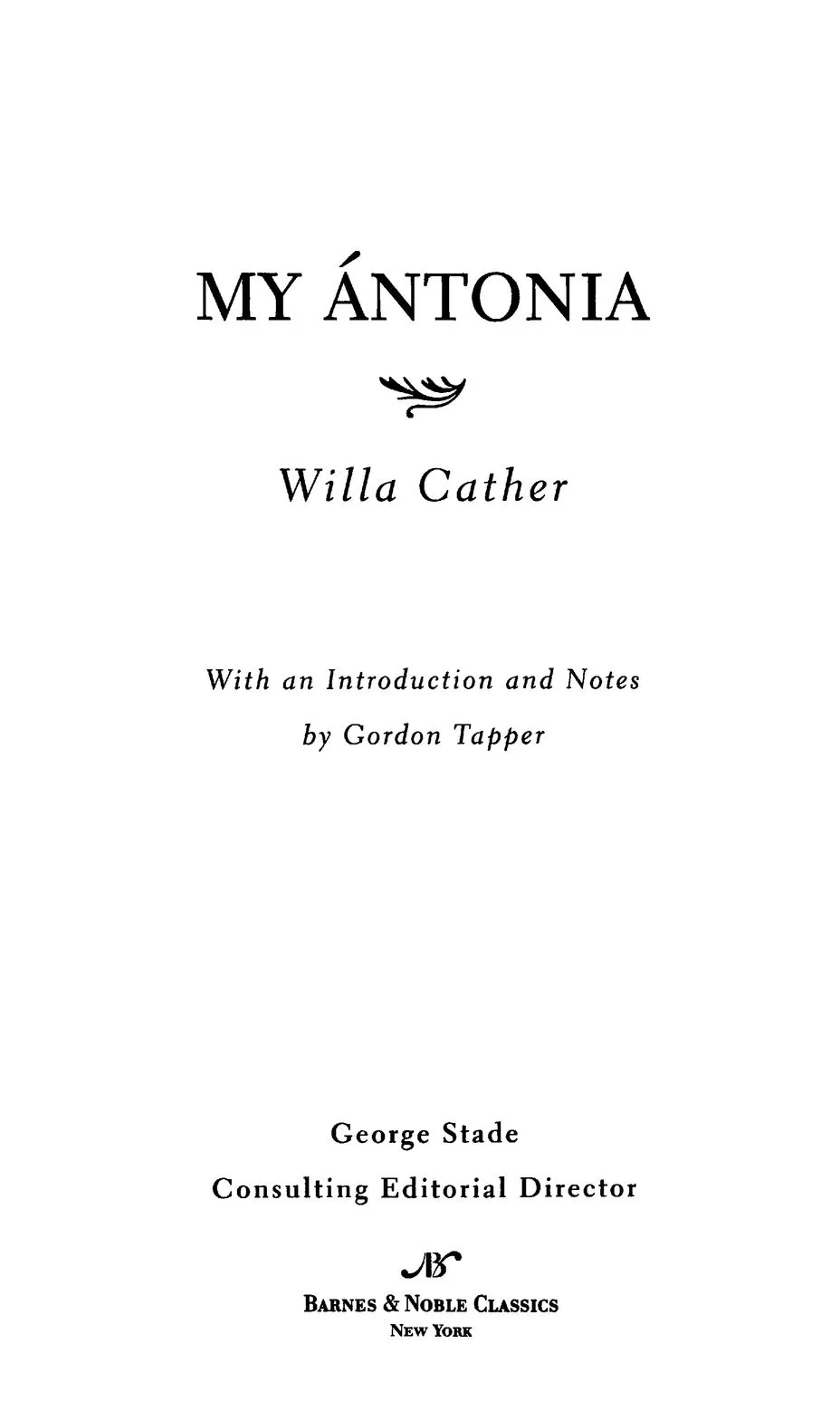My Antonia

Table of Contents
FROM THE PAGES OF MY ÁNTONIA
Title Page
Copyright Page
WILLA CATHER
THE WORLD OF WILLA CATHER AND MY ÁNTONIA
Introduction
MY ÁNTONIA
Dedication
INTRODUCTION
BOOK I - The Shimerdas
I
II
III
IV
V
VI
VII
VIII
IX
X
XI
XII
XIII
XIV
XV
XVI
XVII
XVIII
XIX
BOOK II - The Hired Girls
I
II
III
IV
V
VI
VII
VIII
IX
X
XI
XII
XIII
XIV
XV
BOOK III - Lena Lingard
I
II
III
IV
BOOK IV - The Pioneer Woman’s Story
I
II
III
IV
BOOK V - Cuzak’s Boys
I
II
III
ENDNOTES
COMMENTS & QUESTIONS
FOR FURTHER READING
FROM THE PAGES OF MY ÁNTONIA
If there was a road, I could not make it out in the faint starlight. There was nothing but land: not a country at all, but the material out of which countries are made. (page 11)
That is happiness; to be dissolved into something complete and great. When it comes to one, it comes as naturally as sleep. (page 17)
The low sky was like a sheet of metal; the blond cornfields had faded out into ghostliness at last; the little pond was frozen under its stiff willow bushes. Big white flakes were whirling over everything and disappearing in the red grass. (page 42)
Whenever I saw her come up the furrow, shouting to her beasts, sunburned, sweaty, her dress open at the neck, and her throat and chest dust-plastered, I used to think of the tone in which poor Mr. Shimerda, who could say so little, yet managed to say so much when he exclaimed, “My Án-tonia!” (page 78)
Winter lies too long in country towns. (page 110)
“I ain’t never forgot my own country.” (page 142)
She remembered home as a place where there were always too many children, a cross man and work piling up around a sick woman. (page 174)
In that singular light every little tree and shock of wheat, every sunflower stalk and clump of snow-on-the-mountain, drew itself up high and pointed; the very clods and furrows in the fields seemed to stand up sharply. I felt the old pull of the earth, the solemn magic that comes out of those fields at nightfall. I wished I could be a little boy again, and that my way could end there. (page 192)
In the course of twenty crowded years one parts with many illusions. I did not wish to lose the early ones. Some memories are realities, and are better than anything that can ever happen to one again. (page 197)
It was no wonder that her sons stood tall and straight. She was a rich mine of life, like the founders of early races. (page 211)


Published by Barnes & Noble Books
122 Fifth Avenue
New York, NY 10011
www.BookishMall.com.com/classics
My Ántonia was first published in 1918.
Published in 2003 by Barnes & Noble Classics with new Introduction, Notes,
Biography, Chronology, Comments & Questions, and For Further Reading.
This trade paperback edition published in 2004.
Introduction, Notes, and For Further Reading
Copyright © 2003 by Gordon Tapper.
Note on Willa Cather, The World of Willa Cather and My Ántonia, and Comments & Questions
Copyright © 2003 by Barnes & Noble, Inc.
All rights reserved. No part of this publication may be reproduced or transmitted in any form or by any means, electronic or mechanical, including photocopy, recording, or any information storage and retrieval system, without the prior written permission of the publisher.
Barnes & Noble Classics and the Barnes & Noble Classics colophon are trademarks of Barnes & Noble, Inc.
My Ántonia
ISBN-13: 978-1-59308-202-4 ISBN-10: 1-50308-202-9
eISBN: 978-1-411-43388-5
LC Control Number 2004100758
Produced and published in conjunction with:
Fine Creative Media, Inc.
322 Eighth Avenue
New York, NY 10001
Michael J. Fine, President & Publisher
Printed in the United States of America
QM
7 9 10 8 6
WILLA CATHER

Wilella Sibert Cather was born on December 7, 1873, in the small Virginia farming community of Winchester. When she was ten years old, her parents moved the family to the prairies of Nebraska, where her father opened a farm mortgage and insurance business. Home-schooled before enrolling in the local high school, Cather had a mind of her own, changing her given name to Willa and adopting a variation of her grandmother’s maiden name, Seibert, as her middle name. As a young woman she met Annie Sadilek Pavelka, a schoolmate who would later become the main character in her acclaimed novel My Ántonia (1918).
During Cather’s studies at the University of Nebraska, she worked as a drama critic to support herself and published her first piece of short fiction, “Peter,” in a Boston magazine. After graduation, her love of music and intellectual pursuits inspired her to move to Pittsburgh, Pennsylvania, where she edited the family magazine Home Monthly, wrote theater criticism for the Pittsburgh Daily Leader, and taught English and Latin in local high schools. Cather published her first short story collection, The Troll Garden, in 1905. She moved to New York City the following year to work for McClure’s Magazine as a writer and eventually the magazine’s managing editor.
Considered one of the great figures of early-twentieth-century American literature, Willa Cather derived her inspiration from the American Midwest, which she considered her home. Never married, she cherished her many friendships, some of which she had maintained since childhood. Her intimate coterie of women writers and artists motivated Cather to produce some of her best work.
1 comment